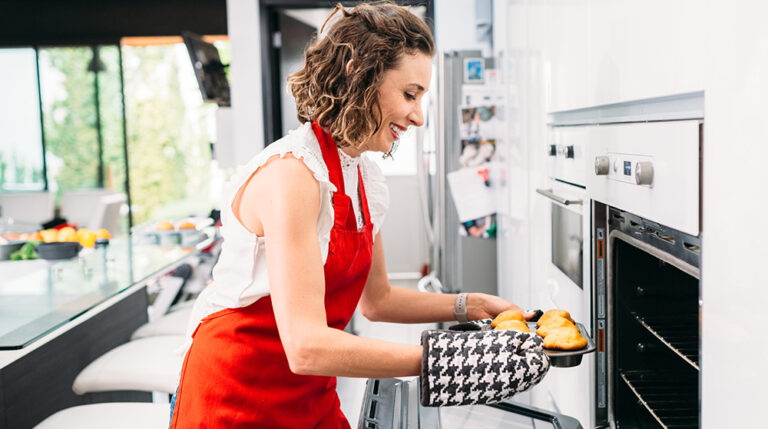Whether you're cooking dinner or preparing a holiday feast, kitchen disasters can happen. Luckily, by following expert tips and being proactive, you can prevent accidents before they happen. Wondering what the top five most common kitchen disasters are? Learn them all and how to safely avoid them.
Slip and fall
- If spilled, wipe it up immediately.
- Check floors before and after cooking to make sure there are no crusts, puddles or other slippery surfaces underfoot.
- If your kitchen flooring is slippery, such as tile or polished wood, consider installing a rug or non-slip mat.
Cuts from a knife
- Store your knives in a block or in a separate container in your kitchen drawer.
- If you have children, make sure knife stations and drawers are out of reach of children or have a secure locking mechanism.
- Surprisingly, another way to avoid cut disasters in the kitchen is to keep your knives sharp. A dull knife can slide off the surface of whatever you're trying to slice or chop, and cut your hand.
Burns
- To prevent mishaps in the kitchen, choose your clothes wisely. Long, loose sleeves, scarves, and ties can get caught on a hot stove and start a fire, or you can end up in boiling water. Wear sleeves that fit snugly around your wrists, and remove any loose ones.
- If you have long hair, tie it up before cooking.
- Rather than using a folded dish towel or a smaller oven mitt, choose an oven mitt that covers your entire hand and wrist.
- When ovens or stoves are in use, establish a child-free zone of at least 3 feet around them and strictly enforce that zone.
- Teach your kids what is hot and what is not hot in the kitchen.
- Cook only when you are upset. Avoid using cooking utensils when you are sleepy or after a night out.
Electrical issues
- Do not overload electrical outlets and do not use extension cords in the kitchen.
- Unplug small appliances when not in use. Faulty wiring in things like toasters and coffee makers can cause fires if left plugged in.
- Discard old electrical appliances. If the appliance or its cord shows signs of damage, sparks, exposed wires, or excessive heat, do not use it.
- Have a professional inspect your home for electrical safety inspections on a regular basis.
Kitchen Fire
- Keep electrical appliances clean and in good condition. Crumbs in your toaster and dirt left in your microwave or oven can cause fires. Clean electrical appliances safely according to the manufacturer's instructions. If an appliance starts acting up, for example making strange noises that weren't there before, stop using it immediately and call a professional.
- Keep towels and oven mitts away from the stove. Both cloth and paper towels can easily catch fire if placed too close to the stove, as can cardboard and plastic food packaging.
- Never leave pots or pans unattended while they are in use.
- Make sure pot handles are facing the center of the stove so no one can bump into them.
- Buy a kitchen fire extinguisher and learn how to use it. Check the pressure gauge needle every month to see if it's in the green zone. If it's not, replace it. Also, replace the extinguisher if there are cracks in the hose or handle, or if the nozzle is clogged with debris.
- If a fire breaks out in your oven or microwave, close the appliance door immediately. The lack of oxygen should put the fire out. If the fire doesn't seem to be going out, call 911.
- If the pot catches fire, use potholders or oven mitts to cover it and remove it from the stove. If you don't have a lid, use a fire extinguisher.
- Never pour water on a grease fire as it can make the situation worse. Instead, try to put out the fire with baking soda or salt. Do not use flour as it can explode.
The most common kitchen disasters can be avoided with the help of these tips: For even more protection and peace of mind, contact your local independent agent today to discuss our comprehensive home insurance policy.


